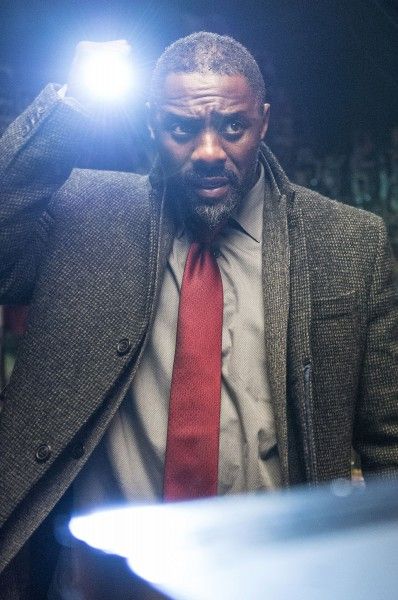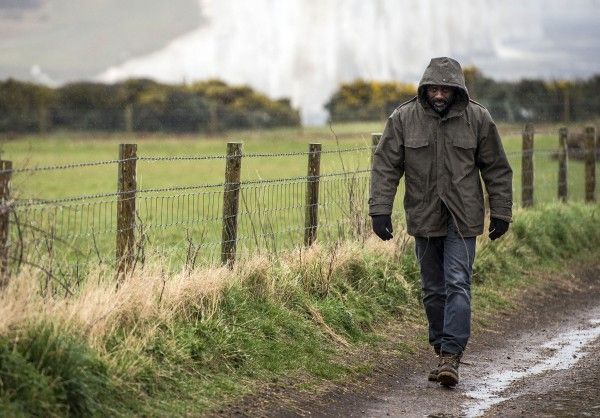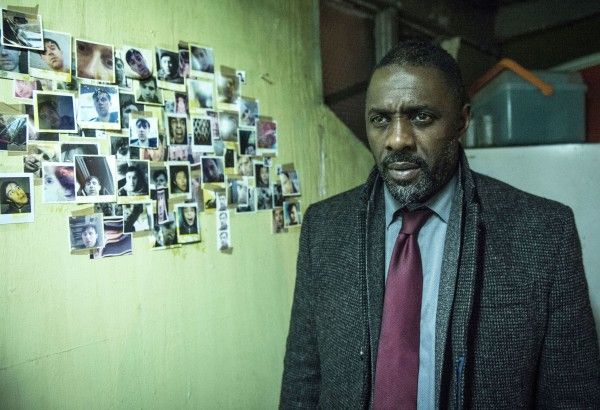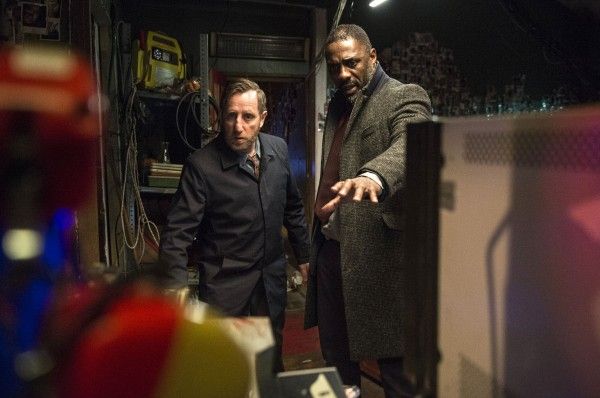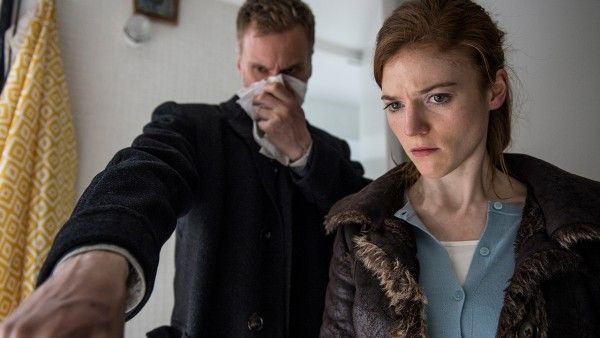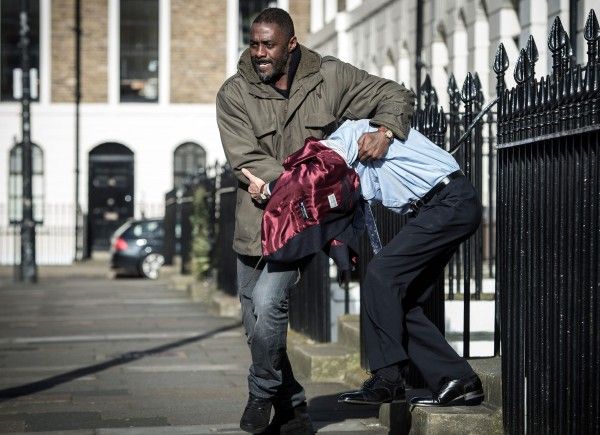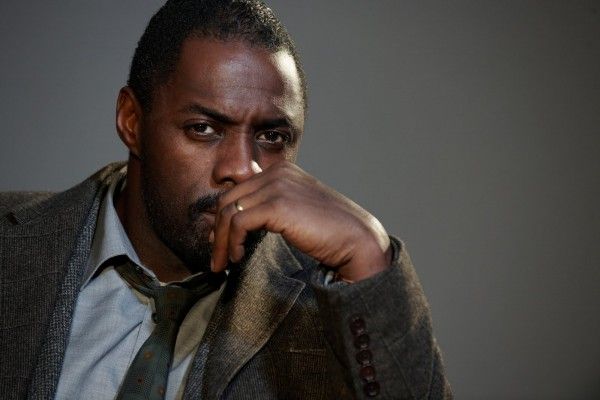The undeniably gripping psychological thriller Luther is back on BBC America for a one-night special event, with Idris Elba returning to his iconic role as self-destructive, near-genius Detective Chief Inspector John Luther. He’s a man on the edge of law enforcement who may never be able to walk away from capturing the tormented psychopaths that lurk the streets of London, so when the terrifyingly complex case of a cannibalistic serial killer comes his way, it not only pulls him out of seclusion but pushes him to a deeper and darker place than he’s ever been.
During this exclusive phone interview with Collider, show creator/writer Neil Cross talked about how intensely gratifying the success of Luther has been, in the UK and US, why they are only able to do a few short hours each season, what it’s like to watch Idris Elba bring this character to life from the page, where John Luther is at, at this point in his life, why Alice (Ruth Wilson) is such an important character, whether Luther has a breaking point, the possibility of further Luther stories, either on TV or on the big screen, and his next series, Hard Sun, commissioned for six episodes by BBC. Be aware that there are some spoilers.
Collider: At what point did you realize that this often unlikely hero was not only connecting with audiences in the UK, but was also having that same strong connection with audiences in the States, as well?
NEIL CROSS: That’s a really good question, and I don’t have a simple answer to it, not least because I’ve got a slightly odd relationship to the show once it’s released into the wider world. It’s a bit like the end of The Yearling, when the kid is crying because the deer has run away. I find broadcast intensely stressful, to the extent that perversely, I’ve never seen anything I’ve written actually broadcast on television. So, the audience response is something which I became aware of gradually. It was a slow-motion version of the end of It’s A Wonderful Life. It was just extraordinary, the way people reacted to the show. It’s a nerve-wracking thing and it’s a scary thing because, in a weird way, it’s such a personal show. It’s certainly not autobiographical, though in many ways, I wish it were because who wouldn’t want to be Idris Elba. What we’re doing is saying, “This is something that I think is really cool. I really like it. I hope you like it, too.” The response is intensely gratifying. I love it!
When you created this show and started down the path of this series, could you have ever imagined that you’d still be telling this man’s story and that this is where he’d be in his life now?
CROSS: No, not at all. I didn’t have a clue. The BBC has been so intensely loyal to this show. pitched the show by saying, “At the beginning, it’s going to look quite like a crime-of-the-week show. And then, by the time we get to the end of the first season, we’re going to realize that it’s become something else altogether. It’s going to become a superhero show, just not quite on those terms.” A fair chunk of the UK audience, two-thirds of the way through the run of the first season just went, “What the fuck?!,” and turned off, en masse. We lost a big chunk of audience. That is another part of the reason that I find broadcast stressful. You wake up in the morning, get bad news, and it ruins your day. So, the answer is no, I had no idea. I was pleased to have the idea. I was pleased to get the script commissioned. Once I got it commissioned, I was pleased to get the series greenlit. It’s not like climbing a hill. I wish it were. If you were to dramatize it, it would be nice to have that moment when you realize the show is a hit, but it’s much more incremental than that. Any kind of perception of success is always weirdly retrospective. I’m terrified now. I’m quaking in my boots.
There are a lot of crime shows on TV, so you become a bit desensitized, but this show has had some of the most terrifying villains.
CROSS: Thank you, that’s the highest possible compliment. When I mentioned how the show started as something like a police show and become something else by the end of the first season, Ben Stephenson, who is the head of drama at BBC, turned around to me, after the broadcast of the first episode of the second season, and he said, “Are you aware that you’ve managed to get a horror show on BBC television?” It is weirdly subversive, in that way.
This is a very unconventionally structured series, with a few episodes here and a two-hour movie there. Did you always approach this in a way where you were just going to write however many hours you needed to tell a specific story, or were there other factors that played into how many episodes you would do, for any given season?
CROSS: There are many, many practical factors. The primary amongst them is that Idris [Elba] is a superstar. Idris’ availability is very limited. In some ways, getting Idris back to the show is like getting Mick Jagger to come play with your band in a pub. But there is all kinds of other stuff, as well. All of it is a slightly unglamorous way of saying that we just make it up as we go along. When we can do it, we do it.
What do you most enjoy about watching what Idris Elba brings to this role and how he brings the work to life from the page?
CROSS: There’s nothing I dislike about it. Watching Idris do this, and watching Idris persona the role, is a weird admixture of intense professional satisfaction and intense personal pride. It’s a once-in-a-lifetime relationship that he and I have with this character. The character is someone that we love equally, and we trust him in each other’s hands. I don’t want to sound luvvie, which is shorthand to the way that people in the entertainment industry talk about each other. In many ways, I wish I had something more gritty and confrontational to tell you about our relationship, but that is just not there. I’m incredibly proud of it.
This guy has lost his wife and he’s lost his best friend, and he’s not particularly in the bet place. Who is John Luther now?
CROSS: One of the bizarre and slightly counter-intuitive side effects of the fact that I love the character so much is that I sit down and enjoy the process of trying to imagine what the worst thing is that I could possibly put him through now. It’s a weirdly abusive relationship. The more I love him, the worse the things are that I want to do to him. He is, at the core of his being, essentially unchanged. He might have had to confront some truths about himself, but I think he’s still the same man and he’s still the same character.
What is it about this particular case that draws him back in from his self-imposed seclusion?
CROSS: Going back to confronting the fundamental truth of himself, it’s where he belongs. It’s his role and his function in life. He might wish it were otherwise. He might wish he were a different person, in the same way that I wish I got up at 5 am and jogged nine miles in the morning.
It’s been so interesting to watch the dynamic between Luther and Alice. The show is called Luther, so he’s obviously at the center of every story you tell, but Alice has become such an important part of his emotional life. As the person who invented her and kept bringing her back, what makes someone like Alice such a fascinating character?
CROSS: I’ve thought about this a lot, and I think I know what it is. What people respond to in Alice isn’t what she does. It isn’t the fact that she kills people. What people respond to in Alice, and I think this includes Luther, is the fact that she takes absolutely untrammeled joy in who she is. She knows exactly who she is, and she knows her own strengths and weakness, and she has fun. After this conversation, I’ll put down the phone, I’ll put on the kettle, I’m make a cup of tea, and I’ll go over every sentence that I said to you with massive self-hatred, and then I’ll crawl under the table ‘cause that’s how I spend my life. We get embarrassed, worried that we said or did the wrong thing, or that we’ve never quite been our best selves or lived up to our potential or let other people walk all over us. Alice has got none of that. She’s the most free human being, and I think people love that.
Was it important to you to at least include Alice, in some way, even if she’s not physically present?
CROSS: She’s a big part of the world and she’s a big part of where he is now. That’s the truth. It would have been disingenuous and unfair to the audience not to have her as part of the world. After the first read through for the very first episode, I went out with the cast and we had a meal, and then we got horribly drunk, as one does in London. I was sitting with Ruth Wilson and she asked me where Alice had come from. She said, “Where did this woman come from? What gave you the idea?” I just said, “Alice is my perfect girl.” And Ruth looked at me with absolute horror. She shifted sideways and started up a conversation further down. It’s an acknowledgment that she’s a big part of the world and, more importantly, a big part of who John Luther is.
You’ve said that you could keep writing this character until he’s old and gray, and Idris Elba has said that this is a character that he could keep playing, as long as you keep writing him. But with everything you’ve put this character through, is there eventually a point where you push him too far and he’ll just completely crack?
CROSS: What I love about the character, and what I think a lot of the audience responds to, is that I don’t think he’ll ever stop. He will get knocked down, he will get hurt, he will get injured, and he will sacrifice whatever is necessary to achieve his goal, at any particular time, or what he’s driven to do, at any particular time. He’ll never stop. He might crack, but he’ll never break.
Ideally, what would be next in the Luther saga? Is it a big screen movie, or would you just continue to write his story, and then figure out if it’s better suited for film or TV?
CROSS: All I’m really concerned about, and I think this goes for Idris too, is that whatever we do next, we do the right thing. And by the right thing, I mean that whatever step we take next, the first criteria we should consider is the people who have been loyal to us, thus far, which is primarily our audience. As long as we do the right thing by the people who love the show, I’ll be happy.
Is this the kind of character that you’re always thinking about the next idea for?
CROSS: When we did think the show was over, after the last season, I wasn’t quite bereft because I was working on other stuff, and what I’m working on, at any given time, is always the most important thing in my life. But there was a constant slightly wistful yearning in the background, as for a lost love. I’d get a great idea and think, “Oh, that would be great for Luther!” So, I’m thinking about him and it all the time, at some level.
Your new show, Hard Sun, which is being described as a pre-apocalyptic crime drama, sounds very different from Luther. Did you intentionally want to explore something very different?
CROSS: Yeah. I don’t want to repeat myself. I hate the idea of coasting and of recycling the same ideas. Then, you’re just subject to the law of diminishing returns. I’m also very acutely aware that it would be disrespectful to what we’ve done, disrespectful to Idris, disrespectful to the audience, and disrespectful to the BBC, just to do a washed-out Luther replacement. I would rather do something completely different and completely new.
What led you to this new idea?
CROSS: A David Bowie song, called “Five Years.” In fact, the working title for Hard Sun was Five Years.
Luther airs on BBC One on December 15th, and on BBC America on December 17th.


